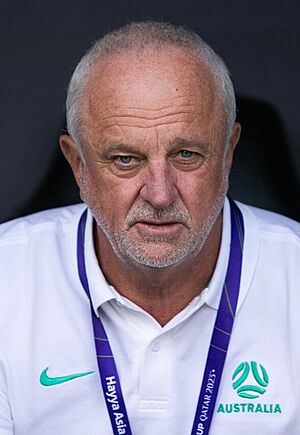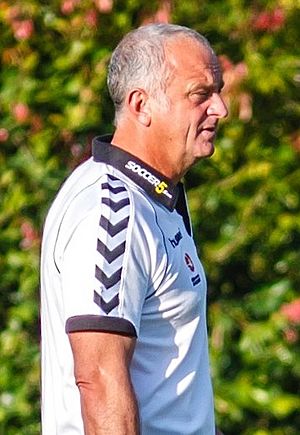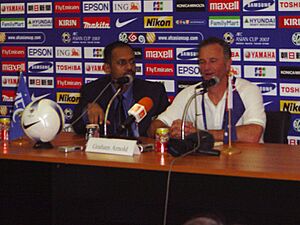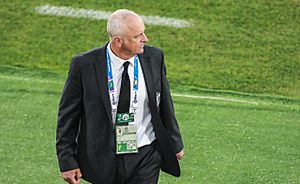Graham Arnold facts for kids

Arnold managing Australia at the 2023 AFC Asian Cup
|
||||||||||||||||
| Personal information | ||||||||||||||||
|---|---|---|---|---|---|---|---|---|---|---|---|---|---|---|---|---|
| Full name | Graham James Arnold | |||||||||||||||
| Date of birth | 3 August 1963 | |||||||||||||||
| Place of birth | Sydney, New South Wales, Australia | |||||||||||||||
| Height | 1.79 m (5 ft 10 in) | |||||||||||||||
| Position(s) | Forward | |||||||||||||||
| Senior career* | ||||||||||||||||
| Years | Team | Apps | (Gls) | |||||||||||||
| 1980–1981 | Canterbury-Marrickville | |||||||||||||||
| 1981–1990 | Sydney United | 178 | (69) | |||||||||||||
| 1990–1992 | Roda JC | 61 | (22) | |||||||||||||
| 1992–1994 | Liège | 60 | (23) | |||||||||||||
| 1994–1995 | Charleroi | 16 | (1) | |||||||||||||
| 1995–1997 | NAC Breda | 63 | (35) | |||||||||||||
| 1997–1998 | Sanfrecce Hiroshima | 28 | (7) | |||||||||||||
| 1998–2000 | Northern Spirit | 47 | (5) | |||||||||||||
| Total | 453 | (161) | ||||||||||||||
| International career | ||||||||||||||||
| 1985 | Australia B | 2 | (1) | |||||||||||||
| 1985–1997 | Australia | 56 | (19) | |||||||||||||
| Managerial career | ||||||||||||||||
| 1989–1990 | ||||||||||||||||
| 1998–2000 | ||||||||||||||||
| 2006–2007 | ||||||||||||||||
| 2007–2008 | ||||||||||||||||
| 2010–2013 | ||||||||||||||||
| 2014 | ||||||||||||||||
| 2014–2018 | ||||||||||||||||
| 2018–2021 | ||||||||||||||||
| 2018–2024 | ||||||||||||||||
| 2025– | ||||||||||||||||
|
Medal record
|
||||||||||||||||
| *Club domestic league appearances and goals | ||||||||||||||||
Graham James Arnold (born August 3, 1963) is an Australian professional football (soccer) manager and former player. He is currently the head coach of the Iraq national team.
Arnold first worked as a coach for the Australian national soccer team in 2000. He helped Australia reach the second round of the 2006 FIFA World Cup as an assistant coach. After that, he became the interim coach for the "Socceroos" (Australia's national team).
Arnold also helped Australia's U23 men's national soccer team, known as the "Olyroos," qualify for the 2008 Beijing Olympics. He then assisted another coach, Pim Verbeek, for the 2010 FIFA World Cup in South Africa.
From 2010 to 2013, Arnold managed the Central Coast Mariners, an A-League club. He led them to win a Premiership and a Championship. He is also a member of the Football Federation Australia Football Hall of Fame. Later, with Sydney FC, Arnold won two Premierships, one Championship, and an FFA Cup. In August 2018, he was again appointed head coach of the Socceroos.
In 2018, Arnold took over as the Australian coach after the 2018 FIFA World Cup. Under his leadership, Australia qualified for the 2022 FIFA World Cup. This was Australia's most successful World Cup campaign. They won multiple group stage games for the first time. Their only group stage loss was to France, who ended up as runners-up. Australia reached the Round of 16 for only the second time in their history. They narrowly lost to Argentina, who became the champions. Arnold left the Socceroos in September 2024.
Arnold holds several records in the A-League. He has managed the fourth most games (211) and achieved the third most wins (116). He also has the third-best winning percentage (54.9%) for managers with over 30 games. He has the best unbeaten percentage (81.5%) and is one of only three managers to win multiple A-League championships. Arnold also holds records for most games coached and most games won as manager of Australia.
Contents
About Graham Arnold
Arnold Place in Glenwood, New South Wales, a suburb of Sydney, is named after him.
In July 2024, the Canberra Road Oval in Sylvania, New South Wales was renamed the Graham Arnold Oval. This was done to honor his career and achievements. This oval is the home ground of Gwawley Bay Football Club. Arnold and his family have a strong connection to this club. It was his first football club, and his parents and brother volunteered there for many years.
His daughter, Elissa Arnold, was the partner of Trent Sainsbury, a Socceroo player, as of February 2017.
Playing Career
Arnold started his football journey as a striker at Gwawley Bay in 1969. He played for them and Sutherland representative teams until 1979. Then, he moved to Canterbury-Marrickville in the New South Wales Premier League.
He later joined Sydney Croatia in Australia's National Soccer League. In 1986, he was the league's top goal scorer and player of the year. After that, he moved overseas to play in the Netherlands for Roda JC and NAC Breda. He also played in Belgium for R.F.C. de Liège and R. Charleroi S.C.. Towards the end of his playing career, he played for Sanfrecce Hiroshima in Japan. Finally, he returned home to play for Northern Spirit FC.
International Playing Career
Graham Arnold played for Australia's senior national team 56 times in official international matches. He scored 19 goals. If you include unofficial matches, he played 85 times and scored 33 goals.
His first full game was on October 23, 1985. It was a World Cup Qualifier against Taiwan in Adelaide. He scored a goal on his debut as the Socceroos won 7–0. His international playing career ended on November 29, 1997. This was during a World Cup Qualifier against Iran at the MCG. The game ended 2–2, and Australia was eliminated.
Coaching Career
Arnold had a brief coaching role early in his career. He coached two games while playing for Sydney Croatia in 1989/90. His main coaching career began in 1998. He became the player/manager for Northern Spirit FC. He coached them for two seasons, helping them reach the playoffs in their first year.
Coaching Australia
In 2000, he became an assistant coach for Australia. He then became the interim head coach in July 2006.
On September 6, 2006, Australia lost 2–0 to Kuwait in an Asian Cup qualifying game. The FFA confirmed Arnold would remain head coach until the end of the 2007 Asian Cup.
Australia started their Asian Cup campaign with a draw against Oman. On July 13, 2007, Australia lost 3–1 to Iraq, who went on to win the tournament. Australia then lost to Japan in a penalty shootout in the Quarter Finals. Arnold continued to manage the Australian U-23 team, helping them qualify for the 2008 Olympics.
He also worked as an assistant to Pim Verbeek for the 2010 FIFA World Cup in South Africa.
Coaching Central Coast Mariners

On February 9, 2010, Arnold was announced as the head coach for the Central Coast Mariners. He stayed with them until the end of the 2012–2013 season. Arnold is known as one of the A-League's best managers because of his work with the Mariners.
After the 2011–12 A-League season, he chose to stay with the Mariners. He signed a one-year extension to his contract. In his three full seasons, Arnold led the club to two A-League Grand Finals, winning one in 2013. He also won the 2011–12 A-League Premiership.
On April 21, 2013, he guided the Mariners to a 2–0 win over Western Sydney Wanderers. This was the first time the club won the A-League Championship. This success helped the Mariners qualify for the AFC Champions League three times in a row. In 2013, Arnold led the Mariners to the knockout stage of Asia's top club competition. This included a 1–0 win against Suwon Bluewings in Korea, just two days after their Grand Final win in Sydney.
Arnold is also known for helping many young Australian players develop at the Mariners. Players like Tom Rogic, Trent Sainsbury, Mathew Ryan, and Mitchell Duke improved under his coaching. They went on to have great careers playing overseas. Some of Arnold's time at the Central Coast Mariners is shown in the 2013 documentary 'The Code: Life with the Mariners'. This film shows the team's winning season and the strong team spirit under Arnold.
Coaching Vegalta Sendai
In November 2013, Graham was wanted by several clubs in Asia, especially Vegalta Sendai in Japan's J1 League. Even though the Australian Football Federation wanted him to be the national team coach, he preferred club football. Within weeks, he agreed to coach Sendai, becoming the first Australian coach at the highest level of Japanese football. He brought his assistant, Andrew Clark, with him to Japan. On April 9, 2014, Vegalta Sendai announced that Arnold had left the club.
Coaching Sydney FC
Arnold became the new head coach of Sydney FC on May 8, 2014.
2014–2015 Season
In his first season with Sydney FC, they finished second in the 2014–15 A-League season. They lost the 2015 A-League Grand Final to Melbourne Victory.
2015–2016 Season
The 2015–16 A-League season was not as successful. Sydney FC finished 7th and missed the Finals Series. However, Arnold led the team to finish first in their group for the 2016 AFC Champions League. They were later knocked out by Chinese team Shandong Luneng.
2016–2017 Season
Arnold changed the squad by releasing 13 players before the season. To help with goal scoring, he brought in Brazilian striker Bobô. He also signed five Australian players, including Bernie Ibini and Alex Wilkinson, who had worked with Arnold before. The season started well, with Sydney FC beating their rivals Western Sydney Wanderers 4–0. They reached the FFA Cup Final but lost 1–0 to Melbourne City.
During the season, some players left, and new ones joined. The team went undefeated for 19 games in the league. They were eventually beaten 1–0 by the Wanderers. This loss made the team stronger, and they remained undefeated for the rest of the season. They earned 19 points out of a possible 21 in their last seven games.
Arnold's third season with Sydney FC was very successful. They won the Premiership and broke several records. They had the most points in a single season (66 points in fewer games than the previous record). They were also the only top-flight football team in Australia to stay in first place all season. Arnold was named Coach of the Year. He ended the season by winning the Grand Final 4–2 on penalties against Melbourne Victory. This made him the first manager to win the championship with more than one club.
Arnold went on to win the 2017-2018 Premiership. He became the first coach in A-League history to win back-to-back Premierships.
A key part of Arnold's success at Sydney FC was his ability to sign talented foreign players. He brought in players like Milos Ninkovic, Bobo, and Adrian Mierzejewski. These players, along with important Australian players, helped Sydney FC achieve great success.
Return to the Australian National Team
On March 8, 2018, it was announced that Arnold would replace Bert van Marwijk as the Australian coach after the 2018 FIFA World Cup. He also took charge of the Olyroos. Arnold started strongly, with his team winning 4–0 against Kuwait national football team. In November 2018, his team drew 1–1 against South Korea. Arnold announced that veteran player Mark Milligan would be the captain.
His first tournament back was the 2019 AFC Asian Cup. Australia, as the defending champions, unexpectedly lost their quarter-final game to Jordan 0-1. They then lost to the hosts by the same score. This led to some criticism for the team's performance.
Despite the criticism, he guided the Olyroos to a third-place finish in the 2020 AFC U-23 Championship. This meant they qualified for the 2020 Summer Olympics (which were delayed to 2021 due to the COVID-19 pandemic). He also led Australia to a record eight straight wins in the World Cup qualifiers.
In June 2022, Arnold guided Australia to its fifth straight FIFA World Cup Finals. The Socceroos won play-off games against UAE and Peru in Qatar. In the play-off against Peru, Arnold made a key decision. Before the penalty shootout, he substituted goalkeeper captain Mathew Ryan for Andrew Redmayne. Redmayne performed well, saving a crucial penalty to help Australia qualify. Arnold had faced a lot of criticism for Australia's performance in the earlier qualification rounds.
In the 2022 FIFA World Cup, Arnold surprised many. He led Australia to the Round of 16 for only the second time in history (the first was in 2006 when he was an assistant coach). They won 1–0 against Tunisia and Denmark. This made him the first Australian-born manager to achieve this. He was also the first Australia manager to win multiple matches in the same World Cup. Australia was later eliminated by Argentina after a close 2–1 defeat. After the tournament, Arnold was named the best coach at the 2022 World Cup by a French sports newspaper. He left the role in September 2024.
Coaching Iraq
On May 9, 2025, Arnold was appointed as the new head coach of the Iraq national team. He took on this role during the third round of the 2026 FIFA World Cup qualifying campaign.
Career Achievements
As a Player
- NSL Cup: 1987
Individual Awards
- NSW Player of the Year: 1985
- National Soccer League Player of the Year: 1986
- National Soccer League Golden Boot: 1986
- Football Australia Hall of Fame: 2004
As a Manager
Central Coast Mariners
Sydney FC
- A-League Championship: 2017 (runners-up: 2014–15)
- A-League Premiership: 2016–17, 2017–18
- FFA Cup Winners: 2017
Individual Awards
- A-League Coach of the Year: 2011–12, 2016–17, 2017–18
- A-League All Star Team Manager: 2011–12
- PFA Manager of the Season: 2011–12, 2016–17, 2017–18
Australia (Assistant Manager)
- FIFA Confederations Cup Bronze Medal: 2001
- OFC Nations Cup: 2000
Australia U23
- AFC U23 Asian Cup Bronze Medal: 2020
Records
- Under Arnold, Australia (Socceroos) became the first nation in FIFA World Cup qualifying history to win eleven (11) consecutive matches in a single qualification campaign (September 2018 – October 2021).
Olympic Games Connection
Graham Arnold has a long history with the Olympic Games. He has been involved in four Men's Football Tournaments, starting with Seoul 1988.
- At Seoul 1988, Arnold was a player in Australia's squad. Australia reached the Quarter Finals, and Arnold played in every match.
- At Athens 2004, Arnold was an assistant coach for the 'Olyroos'. Australia made the Quarter Finals after playing well in their group.
- At Beijing 2008, Arnold was the head coach of the 'Olyroos'. He guided Australia's U23 team through a tough qualification process in Asia. At the Olympics, the Olyroos competed in a group with Serbia, Ivory Coast, and Argentina.
- At Tokyo 2020 (held in 2021), Arnold was again the head coach of the 'Olyroos'. Australia had not qualified for the Olympics since Beijing 2008. Arnold once again led Australia's U23 team through qualification in Asia. At Tokyo 2020, the Olyroos achieved a big surprise in their first game, defeating Argentina 2–0. Arnold coached the Olyroos to help develop young players for Australia's senior national teams. Many young players who gained experience under him have since joined the senior national team or moved to bigger clubs overseas. These players include Denis Genreau, Nathaniel Atkinson, Joel King, Connor Metcalfe, and Marco Tilio.
See also
 In Spanish: Graham Arnold para niños
In Spanish: Graham Arnold para niños
 | Anna J. Cooper |
 | Mary McLeod Bethune |
 | Lillie Mae Bradford |



